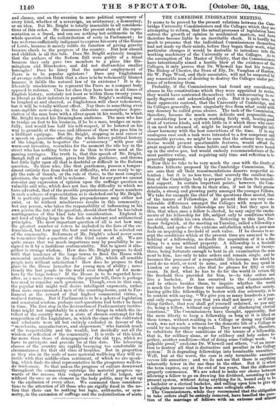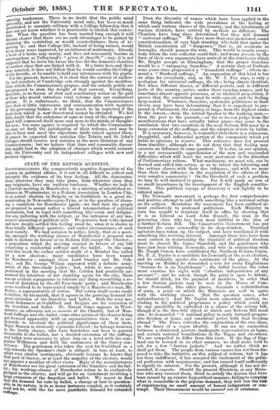THE CAMBRIDGE INDIGNATION MEETING.
IT seems to be proved by the present relations between the Cara_ bridge University Commissioners and the Colleges which they are attempting to reform, that the actual processes of legislation hav outrun the growth of opinion in academical matters, and haves therefore become liable to an inevitable check. It is hardly to,-, much to presume that the individual Commissioners themselves had not made up their minds, before they began their work, what particular changes it would be desirable to introduce into the working machinery of the University or of the Colleges. As to the assumption of the Master of Trinity, that the Commissioners have intentionally aimed a hostile blow at the existence of the Colleges, it only proves that Dr. Whewell has lost his temper.
considerable The Bishop of Chester, the Dean of Ely, Dr. Vaughan of Harrow, Sir W. Page Wood, and their associates, will not be suspected by any reasonable man of desiring to destroy the Colleges under pre. tence of reforming them. Probably, if the Commissioners had found any
abuses in the constitutions which they were appointed to revise, they would have contented themselves with endeavouring to re- medy flagrant and acknowledged evils. But it is quite true, their opponents contend, that the University of Cambridge, and its Colleges generally, were singularly free from what could with any decency be called gross abuses. The task of the Commission, therefore, became the much more delicate and responsible one, of considering how a system working fairly well, bearing good fruit of various kinds, and with little in it which those who carry it on need be ashamed of, might be improved and brought into closer harmony with the best convictions of the time. If in any analogous case such a task were intrusted to a few competent and reasonable persons, we might be sure that the scheme they would devise would present questionable features, would offend the great majority of those whose habits and whose credit were bound up in the status quo, but would embody recommendations of the most positive value, and requiring only time and reflection to be generally approved. Now this we take to be very much the case with the Drafts of Statutes hitherto proposed by the Cambridge Commission. We are sure that all their recommendations deserve respectful at- tention • but it is no less true, that scarcely the smallest frac- tion of the Cambridge body is prepared to give them its unquali- fied support. In certain important ipoints, however, the Com- missioners carry with them in the aims, if not in their precise details, a strong and growing party amongst the younger Fellows. We take for example the chief of the questions thus mooted, that of the tenure of Fellowships. At present there are very con- siderable differences amongst the Colleges with respect to the terms on which their fellowships are held ; but they agree in this that when once a fellow is elected, he may enjoy the emolu- ments of his fellowship for life, subject only to conditions which are strictly within his own choice. Referring to this fact, Pro- fessor Sedgwick, at the meeting on Tuesday, called a fellowship a freehold, and spoke of the extreme satisfaction which a poor man feels on acquiring a freehold of such value. If he chooses to ac- cept the conditions which at the present time are annexed to the holding of a fellowship, no doubt the acquisition of it is a fine thing to a man without property. A fellowship is a freehold without any but moral obligations. A young man of twenty- three, being fortunate enough to beat in an examination the man next to him, has only to take orders and remain single, and he becomes the possessor of a respectable life-income, for which he need do no work, or next to none' and which he may spend in London or any where else that he pleases for fifty or sixty years. In fact, what he has to do for the world in return for the freehold thus provided for him, is—to take orders and live a bachelor. It has occurred to the Commissioners, and to others besides them' to inquire whether the world is much the better for these two sacrifices, and whether society, having gifts like fellowships to bestow with due solemnity, is to be content with saying, "We give you so many hundreds a year, and only require from you that you shall not marry ; or if any- thing farther, that you shall get yourself ordained, as you may do, being a fellow, without any necessity of discharging clerical functions." The Commissioners have thought, apparently, that the mere liberty to keep a fellowship as long as it is liked on these terms, without residing in a College or doing any College work, was not such a witness for the domestic life of a College as could by no ingenuity be replaced. They have sought, therefore, to substitute for these conditions of the tenure of a fellowship, that is, for celibacy alone, or for celibacy and holy orders to- gether, another condition—that of doing some College work. "A palpable proof," exclaims Dr. Whewell and others, "of an inten- tion to destroy all that is distinctive and peculiar in the College system ! It is degrading fellowships into terminable annuities." Well, but at the worst, the case is only terminable annuities versus life annuities ; and we do not see that there is anything inherently lower in the one than in the other. But it is when the term expires, say at the end of ten years, that the difference properly commences. We are asked to make our choice between allowing a fellow to go on drawing his dividend, according to the present system, without doing anything for it, bound only. to be a bachelor or a clerical bachelor, and calling upon him to give up a collegiate income unless he has some collegiate office.
The Coramissioners while they recommend that the obligation to take orders shall be entirely removed, have handled the ques- tion of the marriage of fellows with an extreme and almost
tenderness. There is no doubt that the public mind
ata y, and not the University mind only, has been so much
rec-ustomed to associate celibacy with a College fellowship that it does not yet know whether it is practicable to abolish this restric- tion. When the question has been mooted long enough it will become clearer that there are no such advantages to be gained by retaining the restriction as would counterbalance those of re- moving it ; and that College life, instead of being ruined, would be in many ways improved, by an infusion of matrimony. Already a head of a house may marry, and does not necessarily become as unscrupulous as Talleyrand's "peres de famine" ; nay, it is not supposed that he loves his house the less for the domestic charities of another class that are linked with it. If a tutor here and there were married, it does not follow that he would sacrifice the College to his fireside, or be unable to hold any intercourse with his pupils. For the present, however, it is clear that the current of author- ity and numbers at Cambridge sets strongly against the modifica- tions which the Commissioners propose, and the outside public are not prepared to stem the weight of that current. Everything, therefore, is in favour of slow and conciliatory action on the part of those who would introduce vital reforms into our academical system. It is unfortunate, we think, that the Commissioners have had so little intercourse and communication with members of the governing bodies ; it will be much to be regretted if the dead-lock which is now threatened cannot be obviated. We feel little doubt that the substance of some at least of the changes pro- posed wffi commend itself more and more to the minds of thought- ful men; but some agency is required by which the Commission- ers may set forth the justification of their reforms, and may be able to hear and meet the objections fairly raised against them. It cannot be expected. that societies like Trinity, and St. John's Colleges should receive new statutes at the mere dictation of any Commissioners : but we believe that time and reasonable discus- sion might lead to the adoption of changes which would animate both the University and its independent colleges with new and precious vigour.



























 Previous page
Previous page